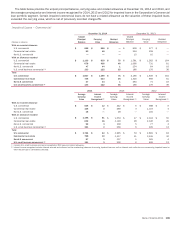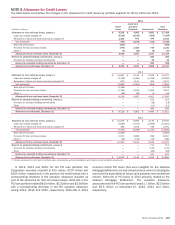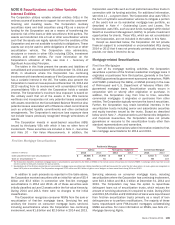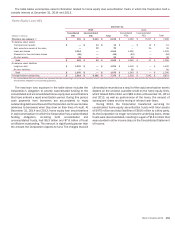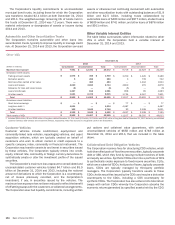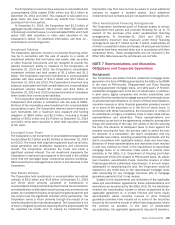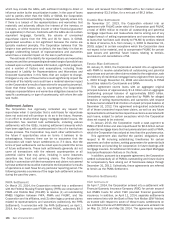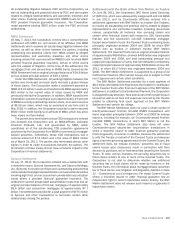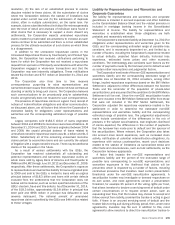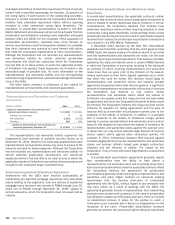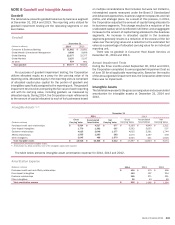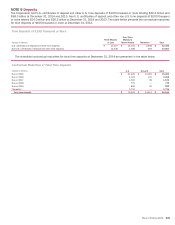Bank of America 2014 Annual Report Download - page 197
Download and view the complete annual report
Please find page 197 of the 2014 Bank of America annual report below. You can navigate through the pages in the report by either clicking on the pages listed below, or by using the keyword search tool below to find specific information within the annual report.Bank of America 2014 195
The Corporation’s maximum loss exposure to consolidated and
unconsolidated CDOs totaled $780 million and $2.1 billion at
December 31, 2014 and 2013. This exposure is calculated on a
gross basis and does not reflect any benefit from insurance
purchased from third parties.
At December 31, 2014, the Corporation had $1.2 billion of
aggregate liquidity exposure, included in the Other VIEs table net
of previously recorded losses, to unconsolidated CDOs which hold
senior CDO debt securities or other debt securities on the
Corporation’s behalf. For additional information, see Note 12 –
Commitments and Contingencies.
Investment Vehicles
The Corporation sponsors, invests in or provides financing, which
may be in connection with the sale of assets, to a variety of
investment vehicles that hold loans, real estate, debt securities
or other financial instruments and are designed to provide the
desired investment profile to investors or the Corporation. At
December 31, 2014 and 2013, the Corporation’s consolidated
investment vehicles had total assets of $1.1 billion and $1.2
billion. The Corporation also held investments in unconsolidated
vehicles with total assets of $11.2 billion and $5.5 billion at
December 31, 2014 and 2013. The Corporation’s maximum loss
exposure associated with both consolidated and unconsolidated
investment vehicles totaled $5.1 billion and $4.2 billion at
December 31, 2014 and 2013 comprised primarily of on-balance
sheet assets less non-recourse liabilities.
The Corporation transferred servicing advance receivables to
independent third parties in connection with the sale of MSRs.
Portions of the receivables were transferred into unconsolidated
securitization trusts. The Corporation retained senior interests in
such receivables with a maximum loss exposure and funding
obligation of $660 million and $2.5 billion, including a funded
balance of $431 million and $1.9 billion at December 31, 2014
and 2013, which were classified in other debt securities carried
at fair value.
Leveraged Lease Trusts
The Corporation’s net investment in consolidated leveraged lease
trusts totaled $3.3 billion and $3.8 billion at December 31, 2014
and 2013. The trusts hold long-lived equipment such as rail cars,
power generation and distribution equipment, and commercial
aircraft. The Corporation structures the trusts and holds a
significant residual interest. The net investment represents the
Corporation’s maximum loss exposure to the trusts in the unlikely
event that the leveraged lease investments become worthless.
Debt issued by the leveraged lease trusts is non-recourse to the
Corporation.
Real Estate Vehicles
The Corporation held investments in unconsolidated real estate
vehicles of $6.2 billion and $5.8 billion at December 31, 2014
and 2013, which primarily consisted of investments in
unconsolidated limited partnerships that finance the construction
and rehabilitation of affordable rental housing and commercial real
estate. An unrelated third party is typically the general partner and
has control over the significant activities of the partnership. The
Corporation earns a return primarily through the receipt of tax
credits allocated to the real estate projects. The Corporation’s risk
of loss is mitigated by policies requiring that the project qualify for
the expected tax credits prior to making its investment. The
Corporation may from time to time be asked to invest additional
amounts to support a troubled project. Such additional
investments have not been and are not expected to be significant.
Other Asset-backed Financing Arrangements
The Corporation transferred pools of financial assets to certain
independent third parties and provided financing for up to 75
percent of the purchase price under asset-backed financing
arrangements. At December 31, 2014 and 2013, the
Corporation’s maximum loss exposure under these financing
arrangements was $77 million and $1.1 billion, substantially all
of which is classified in loans and leases. All principal and interest
payments have been received when due in accordance with their
contractual terms. These arrangements are not included in the
Other VIEs table because the purchasers are not VIEs.
NOTE 7 Representations and Warranties
Obligations and Corporate Guarantees
Background
The Corporation securitizes first-lien residential mortgage loans
generally in the form of RMBS guaranteed by the GSEs or by GNMA
in the case of FHA-insured, VA-guaranteed and Rural Housing
Service-guaranteed mortgage loans, and sells pools of first-lien
residential mortgage loans in the form of whole loans. In addition,
in prior years, legacy companies and certain subsidiaries sold
pools of first-lien residential mortgage loans and home equity loans
as private-label securitizations (in certain of these securitizations,
monoline insurers or other financial guarantee providers insured
all or some of the securities) or in the form of whole loans. In
connection with these transactions, the Corporation or certain of
its subsidiaries or legacy companies make or have made various
representations and warranties. These representations and
warranties, as set forth in the agreements, related to, among other
things, the ownership of the loan, the validity of the lien securing
the loan, the absence of delinquent taxes or liens against the
property securing the loan, the process used to select the loan
for inclusion in a transaction, the loan’s compliance with any
applicable loan criteria, including underwriting standards, and the
loan’s compliance with applicable federal, state and local laws.
Breaches of these representations and warranties have resulted
in and may continue to result in the requirement to repurchase
mortgage loans or to otherwise make whole or provide other
remedies to the GSEs, U.S. Department of Housing and Urban
Development (HUD) with respect to FHA-insured loans, VA, whole-
loan investors, securitization trusts, monoline insurers or other
financial guarantors (collectively, repurchases). In all such cases,
subsequent to repurchasing the loan, the Corporation would be
exposed to any credit loss on the repurchased mortgage loans
after accounting for any mortgage insurance (MI) or mortgage
guarantee payments that it may receive.
Subject to the requirements and limitations of the applicable
sales and securitization agreements, these representations and
warranties can be enforced by the GSEs, HUD, VA, the whole-loan
investor, the securitization trustee or others as governed by the
applicable agreement or, in certain first-lien and home equity
securitizations where monoline insurers or other financial
guarantee providers have insured all or some of the securities
issued, by the monoline insurer or other financial guarantor, where
the contract so provides. In the case of private-label
securitizations, the applicable agreements may permit investors,


